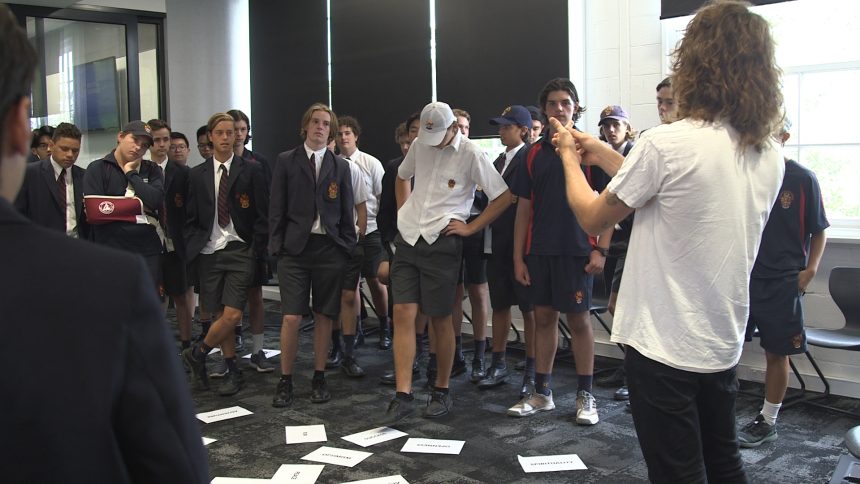What does it mean to be a man?
As long-held beliefs around gender identity and traditional masculine behaviour continue to shift, Australia’s boys – often criticised for exhibiting toxic masculinity – understandably feel confused when navigating their teen years.
Over the past century, considerable progress has been made to reach greater equality for women. Girls have been told (rightfully so) that they can do anything and be anyone.
Today, Australian girls outperform boys across the board academically at almost every level. The University Admissions Centre (UAC) has reported that, when it comes to 2022 university success, “being male was greater than any of the other recognised disadvantages we looked at”.
But it’s not about performance. Girls today benefit from decades of conversation around the complexities of womanhood and what that means for their identity, behaviour and opportunities.
Boys, however, have been left behind. No widespread movement has emerged to help them navigate the complexities of gender. It’s no longer enough to ‘be a man’ — we no longer even know what that means.
The men of tomorrow
To help young boys answer this question, mentoring groups across Australia have made it their mission to chart the waters of masculinity.
Tackling old-school stereotypes, ‘toxic masculinity’, and the national decline in men’s mental health, these groups aim to give teen boys a clear vision of what it means to be a man.
One such group, Tomorrow Man, has brought their roadmap to masculinity into classrooms across the country. Over a two-year program, Tomorrow Man provides students from year 10 and up with six modules, each one aiming to tackle what it means to be a man through guided workshops and training ground sessions.
Principal facilitator Ryder Jack told The Bursar that the program aims to “break the myths around masculinity” by giving boys a safe space to express their thoughts and see real-world examples of healthy male behaviour.
“Boys can’t change or be vulnerable if they’ve never seen it before,” says Ryder. “At Tomorrow Man, we give boys a chance to see that alpha male guy who seems like he doesn’t have a worry speak from the heart – or the hidden guy that’s not seen – all be able to talk about his experiences.
“They’re told time and time again that they have to talk – but for boys without those positive role models, what does that even look like? That’s what they practise with us.”
Tackling toxic masculinity
Today, ‘toxic masculinity’ is synonymous with the now-infamous Andrew Tate and his brother Tristan. With the rise in popularity of the controversial social media icons, many young boys have begun to idolise the pair as role models, echoing their often misogynistic rhetoric in the classroom.
Once the most Googled man in the world, Andrew Tate and his brother shot to fame by offering his (mostly male) fans a recipe for making money, pulling girls and “escaping the matrix”, all the while repeating outdated sentiments of how women belong in the home, can’t drive, and are the property of men.
When tackling these views in their program, Principal Facilitator Ryder says it’s important to understand why boys are attracted to the Tate brothers in the first place.
“Boys currently feel pretty under attack, like they’re being punished for previous generations. During our programs, we get the boys to talk about what they love about masculinity and discuss what are the positive, helpful traits,” he says.
“In our experience, we let the boys at least share what they like about him (Tate). Here, they don’t feel like they’re under attack, and they can speak freely. And once that happens, then they can start a conversation around the problems with some of his messaging.
Further reading: Will Andrew Tate’s Trial Lead To More Young Boys Championing His Cause?
“It’s here we find that most boys already know that he has said some pretty offensive and misogynistic things and discuss how this advice isn’t necessarily the best thing for a sustainable life.”
Creating a masculinity roadmap
The Tomorrow Man initiative takes these teens from “boys to men.” Aiming to be an unofficial right of passage into adulthood, this multi-year program helps boys develop their masculine roles over time as they begin to venture beyond the classroom walls.
“In our eyes, the ideal man is flexible,” says Ryder. “They are helpful, they’re leaders, they are strong, but they’re not limited by the limitations of some aspects of the male stereotype.
“We show the boys that they can express emotion, they can dance how they wanna dance, they can call out behaviours that are unjust, they can dress how they want and have real talks when needed. Our goal is to show the boys that a man combines traditional masculine and feminine traits while being supportive of those who want to do things differently.”
By covering masculine stereotypes, the history of masculine traits, banter culture, male values, intimacy, and male legacy, the program offers students a roadmap that grows with their journey from boys to men.
With the world of gender now expanding beyond the binary lens of male and female, these workshops also welcome people of all genders, who might have something to say about male stereotypes, whether they feel they fit in the box or not.








